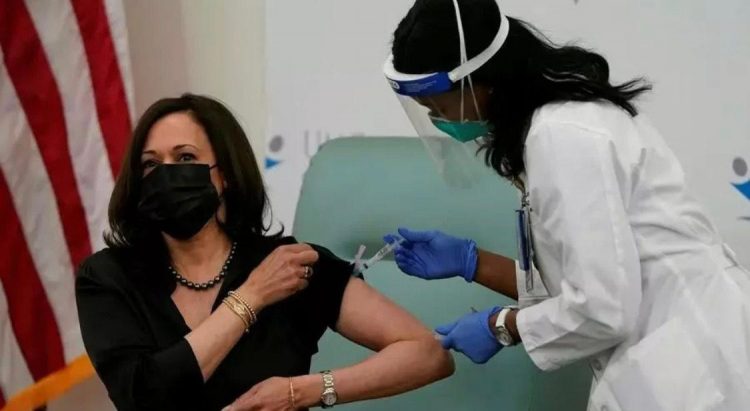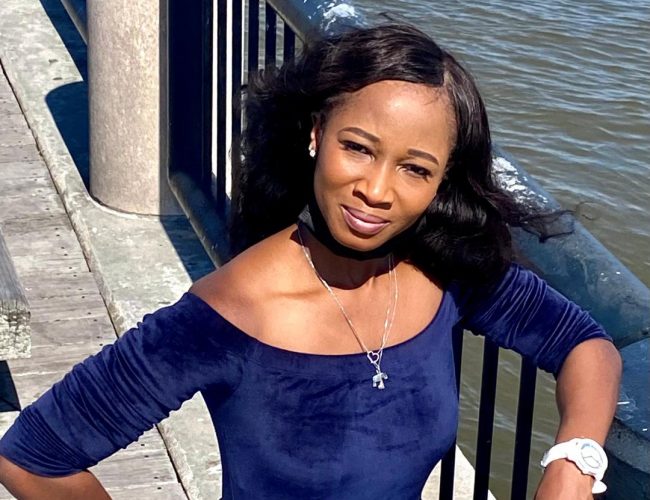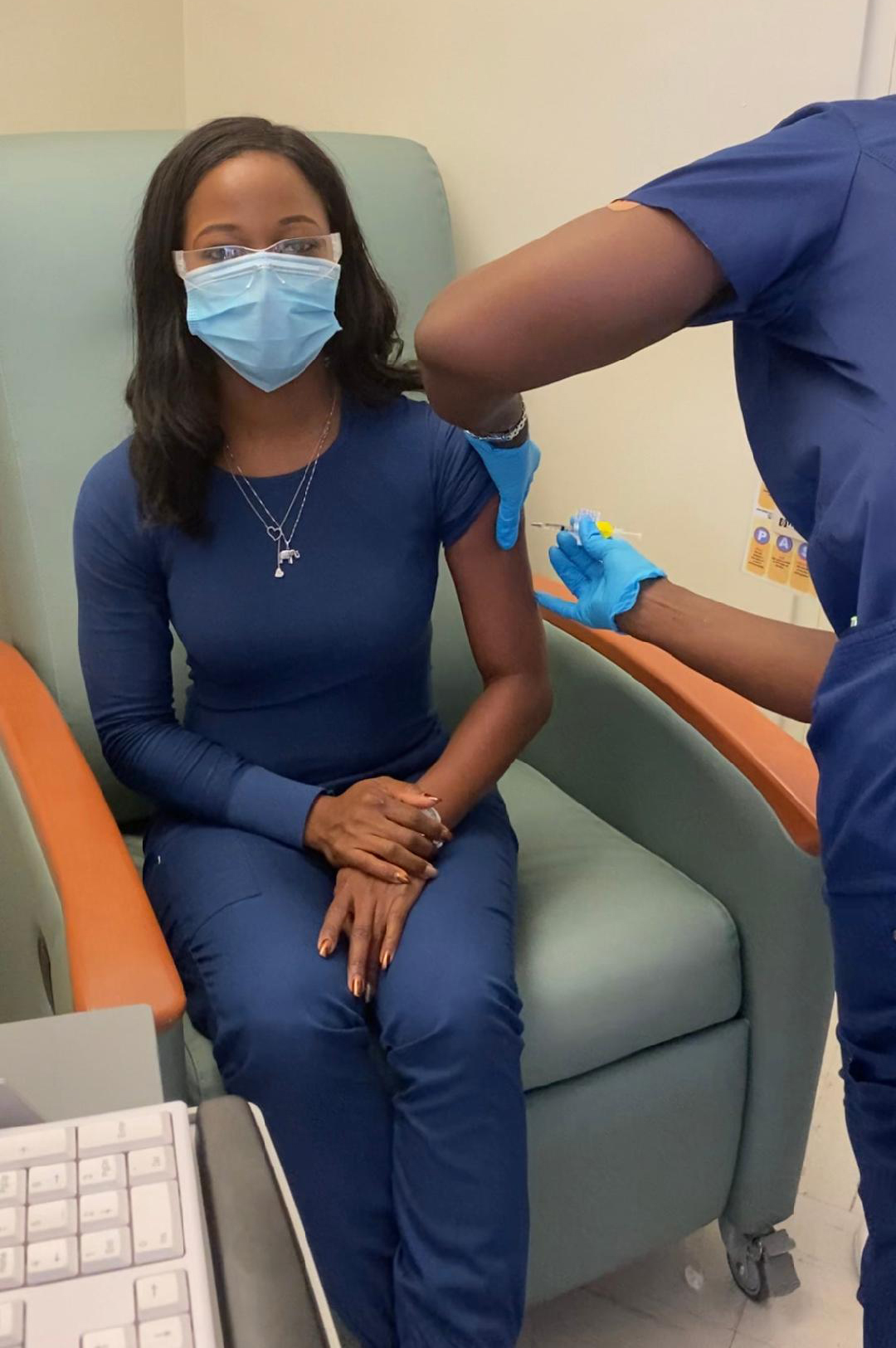Long before Patricia Cummings made headlines for vaccinating United States Vice-President Kamala Harris, she was a nurse who enjoyed caring for her patients as much as she could.
Cummings, who has been a nurse for 16 years and is currently a Clinical Nurse Manager, left Guyana at the age of nine for St Lucia and then moved to the US at age 16. For her, the journey has been more than fulfilling.
“What keeps me motivated is the fulfillment that I feel in the job that I do. Nursing is a profession of grace, of caring, of patience, it is a profession that I can consider reputable. If you are a nurse you are seen as a trusted source that people in the community go to for information, for help and for me it is more fulfilling than anything…,” Cummings told the Stabroek Weekend during a virtual interview while she was in Guyana recently.

Maybe it was because of her being trusted that she was selected to vaccinate VP Harris. She said she was still, “pinching myself and asking how did that happen”. But in the natural sense, it started close to mid-December after the vaccine was approved.
Her hospital, United Medical Center in Washington, DC, opened a vaccination clinic

but there were not enough nurses to administer the vaccine to the staff.
“When I got the whiff of that I volunteered. In my role as a clinical nurse manager, typically my responsibilities are mostly administrative and executive, not so much hands on… so I decided to volunteer my time,” she said.
“As the universe would have it, as God would have it,” she said, she vaccinated members of the executive team of the hospital. While she never asked, she believes it was because of those interactions that she was selected when the hospital received notification that VP Harris had chosen United Medical Center as the place where she would be inoculated.
Even after she received the notification on Christmas Day, she still did not believe it would be a reality although she had to give her information so that the Secret Service could do a background check. To make it all the more surreal, Cummings was sworn to secrecy and could not share the information with her family. She recalled, “It was a heavy, pleasant burden to bear”.
Her biography was requested and while she did not know to what extent it was going to be used, the first thing she wrote alluded to her Guyanese roots as she felt there was a similarity with VP Harris, whose father is Jamaican and mother Indian.
“Surprisingly, I managed to stay calm in the professional role,” Cummings related. “I was nervous, but I managed to maintain my composure and you know I walked her through the process just as I would anybody else that I was administering the vaccine. I maintained that professionalism. I wanted to say ‘girl how you doing?’ but I didn’t. I had to contain myself in my role but she was so nice, so gracious, kind; she was grateful and I am happy she was pleased with my administration because she said ‘Oh that was easy I didn’t feel it’ and I said, ‘oh good I did a good job’”.
Cummings managed to have her family members tune into television network CNN without revealing what was going to happen. It was afterwards when she spoke to them that she got to hear their reaction.
Today she might still be pinching herself as she recalls that on December 29, 2020 she vaccinated the second most powerful person in the United States, but Nurse Pat, as she is fondly called, remains focused on the job she continues to do. On her recent trip to Guyana she did outreaches to help citizens to understand the importance of being inoculated against COVID-19.
Influenced
Cummings said that even though she never met her paternal grandmother, she was influenced by her work as a midwife in the Corentyne area and that played a part in her becoming a nurse.
“She transitioned before I was born…but as I grew up my father always shared her with me and what she did and how she was loved and respected in the community as a nurse. I suppose that had a little bit of influence…,” she said.
But the biggest influence came when she migrated to the US and interacted with an aunt who has a doctorate in nursing and would share her stories and experiences with patients. Cummings was “intrigued by those stories and I suppose that is what prompted me to pursue nursing”.
For her, having people go to the hospital broken, whether it is their kidneys, their heart, their liver, whatever it is and being part of a bigger team that helps to mend them so that they leave better than how they arrived, is rewarding.
“Even in those instances where they don’t get to leave because their situation is so grave that there is nothing that you really can do, the consolation is that while they were in your care you were able to pour something into them it might not have been physiological but psychological that you hope would take them in their transitioning, it is fulfilling. So for me that is what has kept me in nursing thus far,” she shared.
Over the years, she has had many experiences that stayed with her. She recalled that at one time she worked in what she described as “one of the roughest environments” where she saw many patients afflicted by mental illness, underprivileged, and underserved. She remembers a young man who became a paraplegic due to gunshot wounds sustained because of the lifestyle he led. He was a difficult patient as he cursed the staff and nothing anyone did was good enough. He was also resistant to the care being offered.
“As nurse manager it [was] my job to reconcile or to support patient experience and to do service recovery. He was someone that was a frequent flyer that came often and the very first time we met it wasn’t pleasant. He cursed me out and didn’t want me in his room…,” she said.
But over time and with some research she realised that he was just an angry young man in his early 20s. She took a different approach and was able to sit with him and have a one-on-one conversation.
“He ended up crying and he ended up opening up and we got to an understanding… I got through to him and I said, ‘Listen I understand you are angry but you having these outbursts and being nasty to the staff is not going to help you in your recovery…,’” she said.
The patient adjusted his behaviour and his health care outcome was a lot better as he allowed the staff to do what they had to do and he benefited. Looking back, she said, all it required was to have someone listen to him and have someone “tell him as it is”.
She noted that a lot of the time nurses deal with the psychological aspect of patients. And while she loves what she does, Cummings said over the years she has been careful to have a balanced life as the work does take a toll, no matter how patient one is.
“I have learned over the years to have a… support system that helps me deal with emotions and psychological effects that are spill offs from working in that environment.” she said.
‘Get vaccinated’
During her recent trip to Guyana, Nurse Pat held sessions with members of the Guyana Defence Force and attempted to dispel fears and myths they had about the vaccine. She also partnered with the Regional Democratic Council in Linden (Region 10 has one of the lowest vaccination rates in the country) to foster vaccine confidence. She was also on local television and provided information about COVID as well as the vaccination.
She pointed out that Guyana is at a Level 3 in infection rate as per the United States Centers for Disease Control, which has four levels with the fourth being the highest. Looking at the rates, if the numbers — with over 530 deaths and over 21,000 cases — continue she believes the country will hit Level 4. Most concerning for her is the Delta variant of the virus ,which is a major threat worldwide as it is more prolific and as such she believes it is imperative that persons become vaccinated.
She described some of the concerns she has heard here as legitimate and said she will not “negate the legitimacy of people’s concerns”. She has heard that Guyana does not have the best vaccine as in the US, if people get the vaccine they can still get the virus and if they get the vaccine they still have to wear their masks. Some have also argued that they are young and take natural remedies and build their immune system.
“All of those things are good arguments,” she said, “but they are not enough for me as a professional to say don’t take the vaccine. There is nothing that beats the vaccine right now. You can mask up all you want. You can social distance all you want. You can wash your hands all you want and I encourage that, but that’s temporary… For long immunity and for long-term protection, vaccines are the only source scientifically proven to protect us,” she pointed out.
And while fully vaccinated people have still been infected, she said, the difference is that the extremities of the illness from the infection have been a lot less. Studies, she said, have shown that if vaccinated persons contract the virus they do not die or do not have severe illness or end up in an Intensive Care Unit.
“The vaccine certainly helps to provide a certain degree of protection and buffer from illness and death… I have seen deaths as a result of the coronavirus. I have seen families disrupted and changed because their loved ones have passed and again the only way to combat this is through vaccination,” she maintained.
She shared that she has been vaccinated and friends and colleagues have also been vaccinated and they are all doing quite well.
“I encourage everyone to get vaccinated,” she appealed.
Difficult
Leaving Guyana at age nine was difficult. At the time she attended West Ruimveldt Primary and Sir Wilfred Success was her teacher and leaving her childhood friends to go to a new place and learn how to make friends all over again was tough.
“But I actually made it and I did what I did but what I will say is, those friends that I had from elementary school, primary school, are my real friends… I have moved around so much. At age nine, I went to St Lucia and then at age 16 I went to the United States. My foundational friends are the ones I had in Guyana,” she shared.
To this day, if they travel abroad they meet up and whenever she visits Guyana they also meet up.
If she thought moving to St Lucia was tough, going to the US was a culture shock for the then teenager. Migrating in the millennium, in 2000, did not make it easier as she said, “There were so many things going on. Transitioning took some time. Again, it was a little bit difficult but I adjusted. I suppose it was because I was a lot older at that time and I had completed high school. So it was a lot easier to transition, but there was a culture shock nonetheless because the United States is in no way comparable to the Caribbean or the West Indies.”
Cummings graduated with her associate degree in nursing in 2005 and in 2008 she graduated with a bachelor of science in nursing. In a few months, she will graduate with her masters of science in nurse executive leadership. After working as a nurse at a hospital, she ventured into homecare nursing as a consultant and then case management attached to the New York Presbyterian Brooklyn Methodist Hospital. Thereafter she relocated to the Maryland/Virginia area and has been in nursing leadership ever since.
“And that is my passion right now, that is what I am most passionate about… Having been a nurse at the frontline and a lead nurse for many years I am very familiar with some of the challenges that the frontline staff deals with. And so it [helps] me to lead and manage appropriately because I am not far removed from what they deal with and so I enjoy being a leader,” she said, describing her leadership style as being a mixture between servant and transformational leadership.
She hopes to move on to a PhD in health management or some area in healthcare that deals with leadership and management.
Both of Cummings’s parents are educators and she has an older brother who is also a nurse but is in the field of psychiatry. She is a mother of two — a 12-year-old girl and a nine-year-old boy — who she said, “are my world” and while she is single she is engaged to be married soon.
Besides being a nurse, Cummings is an entrepreneur as she and her fiancé have a health and wellness business where they offer counselling and consulting on wellness, health and nutrition, vascular screening, vascular studies among others. She is also an event planner and decorator by night and that business is called Crystal’s Delight after her daughter. The wellness business is called Two In One ME, which translates to two nurses one message excellence.
Cummings encourages young people to always aim to be the best version of themselves. Especially to young girls, she says, it is the “era of the woman” noting that the US has its first woman VP.
“I want young people to take away that nothing is impossible, and I am a prime example. This young girl from Guyana, who is a nobody, opportunity just fell in my lap and I am grateful that I embraced it and I can’t explain all of the doors that have opened for me as a result,” she shared.
She advises young people to apply themselves and “be ready, be prepared and when opportunity comes your way you can jump right into it, there is nothing you can’t do”.





